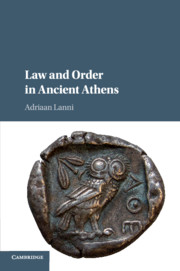ONE - Informal Social Control and Its Limits
from PART ONE
Published online by Cambridge University Press: 05 August 2016
Summary
The most obvious explanation for Athens’ orderliness in the absence of a strong state may be that informal controls such as social sanctions and internalized norms were much more important than the operation of the law courts. After all, recent research suggests that fear of punishment is not the primary reason contemporary Americans obey the law, and no society could function if all citizens operated as Holmesian “bad men,” restrained only by the likelihood of detection and punishment. It may be tempting to think that informal controls must have been even more potent in a small, relatively homogenous, city-state like Athens. But the power of informal mechanisms, standing alone, is easily overstated.
This chapter explores the four major categories of informal social control in Athens: social sanctions like ridicule and shunning; internalized norms (i.e., compliance based on belief in the norm rather than the fear of getting caught); self-help and private discipline such as revenge killings and private punishment of slaves; and alternative dispute resolution like settlement and arbitration. I argue that these methods, though significant, were less pervasive and effective than one might think. Specifically, I contend that social sanctions may not have been as frequent or as powerful as is commonly supposed, that internalized norms were unlikely to have been the primary factor driving widespread compliance, that self-help and private discipline, though important, were primarily limited to matters involving the household, and that alternative dispute procedures applied only to private disputes and therefore could not promote compliance with public norms. Perhaps most important, I explain how the operation of each of these “informal” mechanisms was dependent in critical respects on the formal legal system.
Throughout, I emphasize the limitations of informal means of social control in Athens not because I believe these mechanisms were unimportant – quite the contrary. Rather, my argument is simply that informal means of control alone cannot explain the enigma of Athens’ orderliness. This book seeks to illuminate the role played by formal legal institutions, a role that has not been fully appreciated and explored. As we will see in Chapters 3–6, to understand how order was maintained in Athens, we will need to examine the various ways in which formal legal institutions interacted with informal mechanisms to foster compliance with norms.
Information
- Type
- Chapter
- Information
- Law and Order in Ancient Athens , pp. 17 - 46Publisher: Cambridge University PressPrint publication year: 2016
